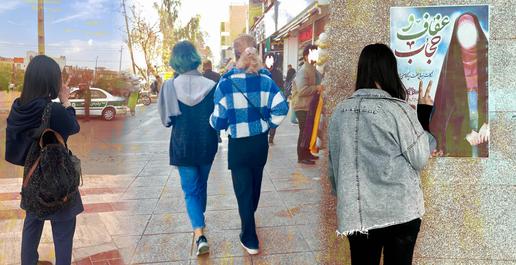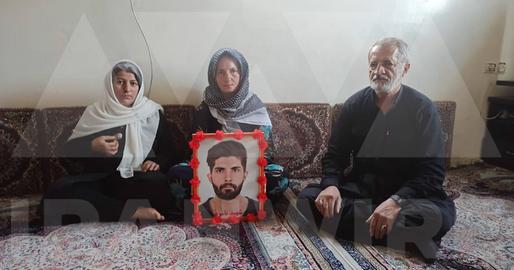Iranian authorities are denying emergency medical treatment to women who defy the mandatory hijab rules.
Security officers in various administrative and service departments have intensified warnings and restrictions on women's attire.
Government authorities announce new protocols daily for enforcing the mandatory hijab in sectors such as service, administration, healthcare, and education.
In a recent development, the head of the Food and Drug Organization, under the Ministry of Health, stated that pharmacies failing to adhere to hijab regulations would receive warnings, with repeated offenses affecting their allocation in subsequent stages.
These remarks prompted a response from Hadi Ekhvatpour, head of the Supreme Council of Iranian Pharmacies.
Ekhvatpour contended that enforcing hijab for patients within pharmacies is impractical, emphasizing the primary duty of pharmacies to provide essential medication, irrespective of a patient's attire.
He said, "Treatment worldwide does not discriminate based on identity, religion, or attire. A patient's health is not contingent upon their beliefs or dress."
While acknowledging instances of warnings and even closure of pharmacies due to staff attire, Ekhvatpour clarified that such actions fall under the purview of premises management, not the Food and Drug Organization.
The reality in treatment centers starkly contrasts with the ideal treatment conditions highlighted by Hadi Ekhvatpour.
According to employees and doctors within treatment departments, unprecedented events unfold regarding the enforcement of hijab in treatment settings.
Staff members from various cities have told IranWire that the rigour of enforcing mandatory hijab for female patients and treatment staff intensifies with each passing day.
A pharmacist doctor from Tehran told IranWire that directives mandating female staff to wear headscarves have been issued repeatedly in recent months.
"Inspectors have visited pharmacies to assess staff attire," the doctor said, adding that compliance with headscarves-wearing regulations is particularly stringent in larger, high-profile pharmacies.
Nurses and doctors also told IranWire that enforcement measures in other cities exceed those in Tehran.
"During one of my night shifts, several women arrived at the clinic, some without headscarves. As I was attending to them, a guard rushed in and threatened to expel them from the clinic if they did not comply with hijab regulations. Fearing repercussions, they hastily donned headscarves," a doctor in Qazvin said.
The doctor noted that the medical system and local authorities have received numerous SMS messages warning of potential closure if treatment staff or patients fail to adhere to hijab regulations.
However, the doctor emphasized that enforcement practices vary.
Notably, a relative who is a martyr's family member disregards hijab norms without facing repercussions.
"It appears that even those affiliated with the government enjoy a degree of leniency regarding hijab," the doctor said.
A nurse from Isfahan painted a grim picture of conditions in government hospitals, citing heightened surveillance by hijab officers via cameras.
"Recently, a female colleague's headscarf slipped off while attending to a patient. The officers promptly issued a warning via camera feed, causing extreme distress to the nurse," the nurse recounted.
The nurse noted that medical staff, concerned about job security, generally avoid confrontation with security personnel.
Yaser Qoreyshi, a doctor told IranWire of the imposition of similar restrictions in other medical centers, previously witnessed in hospitals affiliated with the IRGC.
For instance, at Baghiyatullah Azam Hospital in Tehran, emergency patients were denied treatment simply because they lacked a headscarf, despite the urgency of their condition, according to Qoreyshi.
He noted that the Islamic Republic is now extending this practice to other medical facilities.
As a member of Doctors Without Borders, Qoreyshi emphasized the ethical lapse of such actions, highlighting how they disrupt treatment accessibility, leaving many without necessary services.
According to Qoreyshi, doctors are ethically obliged to provide medical care to all, regardless of whether they adhere to mandatory hijab requirements, as dictated by their oath.
Mohammad Oliyaei Fard, a lawyer, denounced the lack of legal grounds for threats to cut pharmacy quotas due to non-compliance with mandatory hijab regulations.
He elucidated the principle of "Personal Punishment" within Iran's criminal law system, which stipulates that only those directly involved in a crime should face consequences.
Therefore, punishing shopkeepers or pharmacists for a customer's failure to adhere to hijab regulations violates this principle, as they bear no responsibility for the individual's actions.
Despite the ethical objections from human rights organizations, lawyers, and medical professionals like Yasser Qoreyshi, government officials prioritize their ideological stance over medical ethics, leading to the continuation of restrictive practices.

























comments